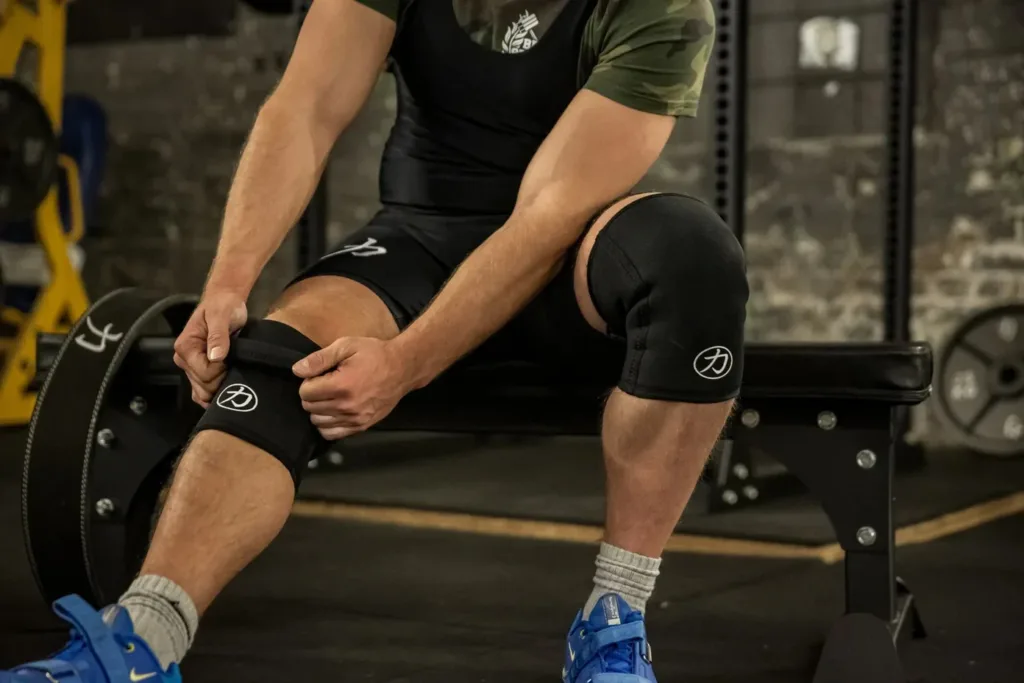Table of Contents
ToggleKnee Sleeves 101: How to Know If You Need Them and Use Them to Maximize Your Gains
Introduction
When it comes to weightlifting, every piece of gear has its purpose—knee sleeves included. But while knee sleeves are popular among lifters, not everyone needs them. These supportive wraps are designed to add stability, reduce knee pain, and potentially improve performance, but they’re not a one-size-fits-all solution. This guide will help you determine whether knee sleeves are right for your weightlifting journey by exploring the purpose of knee sleeves, when you might need them, and how to choose and use them effectively.
Do You Need Knee Sleeves for Weightlifting?
Purpose of Knee Sleeves in Weightlifting
Knee sleeves are primarily designed to protect and stabilize your knees during high-intensity lifting sessions. They provide compression, which helps increase blood flow, reduce joint inflammation, and offer mild knee support. This can make a big difference in exercises that put a lot of stress on the knees, such as squats and deadlifts. However, they’re not necessarily essential for everyone.
Knee sleeves also provide warmth to the joint, which can improve flexibility and decrease stiffness. This can be especially helpful in cold gyms or if you tend to struggle with joint mobility. But keep in mind that knee sleeves won’t prevent injuries if you have poor form or other underlying issues.
Signs That You Might Need Knee Sleeves
Not everyone needs knee sleeves, but there are some key signs that indicate they could be helpful:
Chronic Knee Pain or Discomfort
If you regularly experience knee pain during or after lifting sessions, knee sleeves might help alleviate some discomfort. However, knee sleeves aren’t a cure-all, so it’s essential to consult a professional if you have persistent knee pain.Lifting Heavy Weights Regularly
Lifters who frequently lift near their max, especially in exercises that heavily engage the knees like squats or lunges, may benefit from the extra support. Knee sleeves can help prevent wear and tear on the joints, which is especially important for those lifting heavy on a regular basis.Recovery Support After Intense Workouts
Some lifters find that knee sleeves aid in recovery by providing gentle compression. This can help reduce swelling and stiffness post-workout, making it easier to bounce back after tough sessions.
How to Determine if Knee Sleeves Are Necessary for Your Routine
A great way to determine if knee sleeves are worth adding to your routine is to assess your goals, pain levels, and training frequency. For those lifting light to moderate weights, knee sleeves might not be necessary. However, if you’re feeling discomfort or looking to add some joint support as you progress in your training, they could be a beneficial addition.
When to Use Knee Sleeves in Weightlifting
During High-Intensity Training
High-intensity workouts, especially those involving explosive movements or lifting near max capacity, place extra stress on the knees. Knee sleeves can offer a bit more stability and support, helping keep your form in check. During movements like squats, lunges, and leg presses, the knee joint undergoes a lot of pressure, so wearing sleeves in these situations can be beneficial.
Recovery Days and Active Rest
Using knee sleeves during lighter, recovery-focused workouts can also help support your joints. Activities such as light cycling or walking with knee sleeves can promote blood flow, helping to ease soreness and prevent stiffness. Knee sleeves aren’t just for the heavy lifting days—they can also assist in low-impact, high-rep exercises that put repetitive strain on the knees.
Preventative Use During Joint Stiffness or Cold Weather
If you feel stiffness or have trouble warming up your knees, using knee sleeves at the start of your workout might help. The compression and warmth from the sleeves can assist in loosening up your joints, making it easier to ease into your exercises and potentially reducing the risk of strains or injuries.
Choosing and Using the Right Knee Sleeves
Choosing the Right Size and Fit
Finding the right fit is crucial for knee sleeves to work effectively. Sleeves that are too tight can restrict blood flow and be uncomfortable, while loose sleeves won’t provide enough support. Most brands provide sizing charts, so measure your knee circumference and check these charts before purchasing. A snug, supportive fit will give you the best results without compromising comfort.
Understanding Thickness Levels for Different Lifting Needs
Knee sleeves come in various thicknesses—typically 3mm, 5mm, and 7mm. Lighter lifters and those needing minimal support might prefer 3mm sleeves, while 5mm is versatile for general use. Heavy lifters or those competing in powerlifting often prefer 7mm sleeves, which provide maximum support. Think about your lifting style and choose the thickness that best aligns with your needs.
Maintaining Your Knee Sleeves for Longevity
Like any workout gear, knee sleeves require maintenance. To avoid odor and keep them in good shape, wash them regularly according to the manufacturer’s instructions. Air-dry them to preserve their elasticity. With proper care, your knee sleeves should last several years, supporting your lifting journey for the long haul
TOP BEST KNEE SLEEVES
Conclusion
Knee sleeves can be a game-changer for some weightlifters, especially those lifting heavy weights or dealing with knee discomfort. However, they’re not essential for everyone. By understanding your training goals, evaluating your knee health, and choosing the right fit and thickness, you can determine if knee sleeves will be beneficial in your routine. Whether you’re seeking joint support, pain relief, or just an added sense of stability, knee sleeves can be a valuable tool in your lifting arsenal.
FAQs
Q1: Are knee sleeves only for advanced lifters?
Not necessarily! While they’re popular among heavy lifters, knee sleeves can be beneficial for anyone experiencing knee discomfort or needing extra joint support. Even beginners can use them if they feel it helps with their comfort and stability.
Q2: Can knee sleeves prevent knee injuries?
Knee sleeves can help provide support, but they’re not a substitute for good form or proper lifting techniques. They may reduce discomfort and assist in maintaining stability, but they won’t prevent injuries caused by improper form or excessive load.
Q3: How do I know if my knee sleeves are too tight?
Your knee sleeves should feel snug but not restrictive. If they’re cutting off circulation, causing discomfort, or limiting your range of motion, they’re likely too tight. Opt for a size up if this is the case, and consult the brand’s sizing chart for guidance.
Q4: Should I wear knee sleeves for all exercises?
No, knee sleeves are most useful for exercises that place strain on the knee joint, like squats and lunges. Wearing them for upper body exercises or cardio might be unnecessary unless you’re dealing with joint pain or instability.
Q5: How often should I wash my knee sleeves?
It’s best to wash your knee sleeves after every few workouts, especially if you sweat heavily. Washing regularly helps prevent odor and keeps the material fresh and effective.




